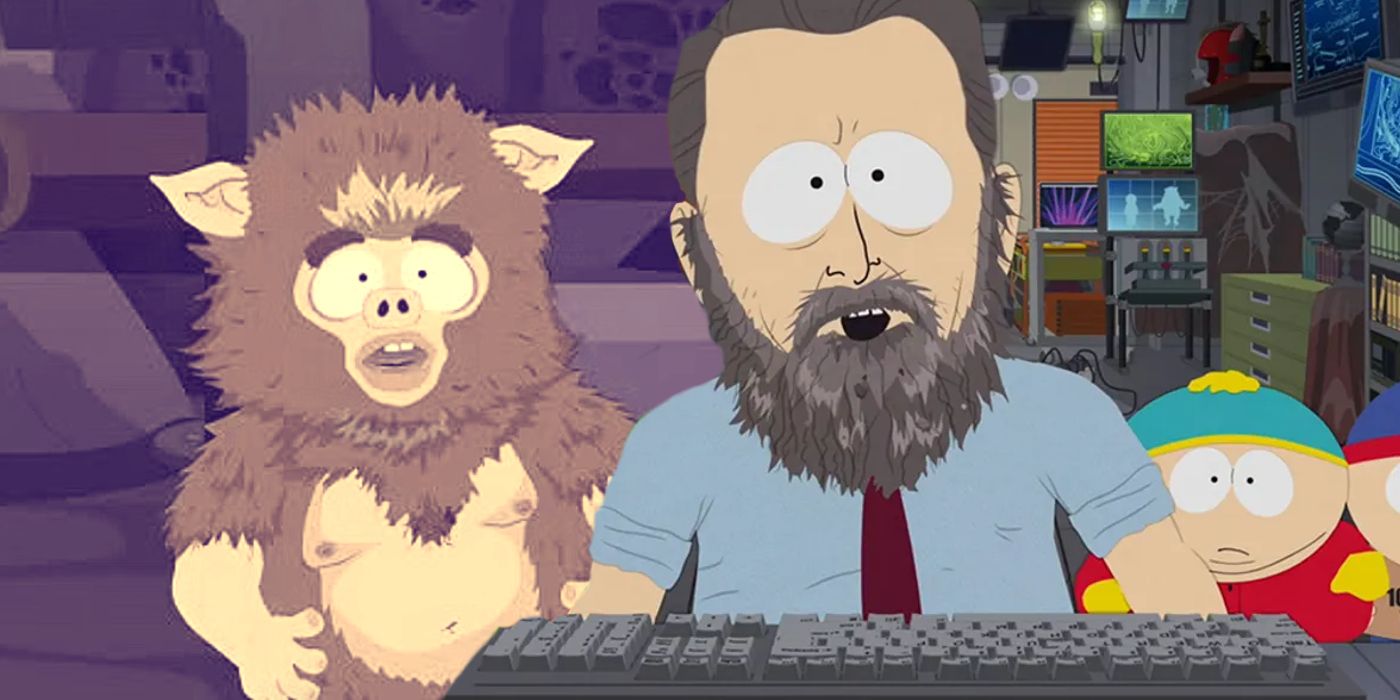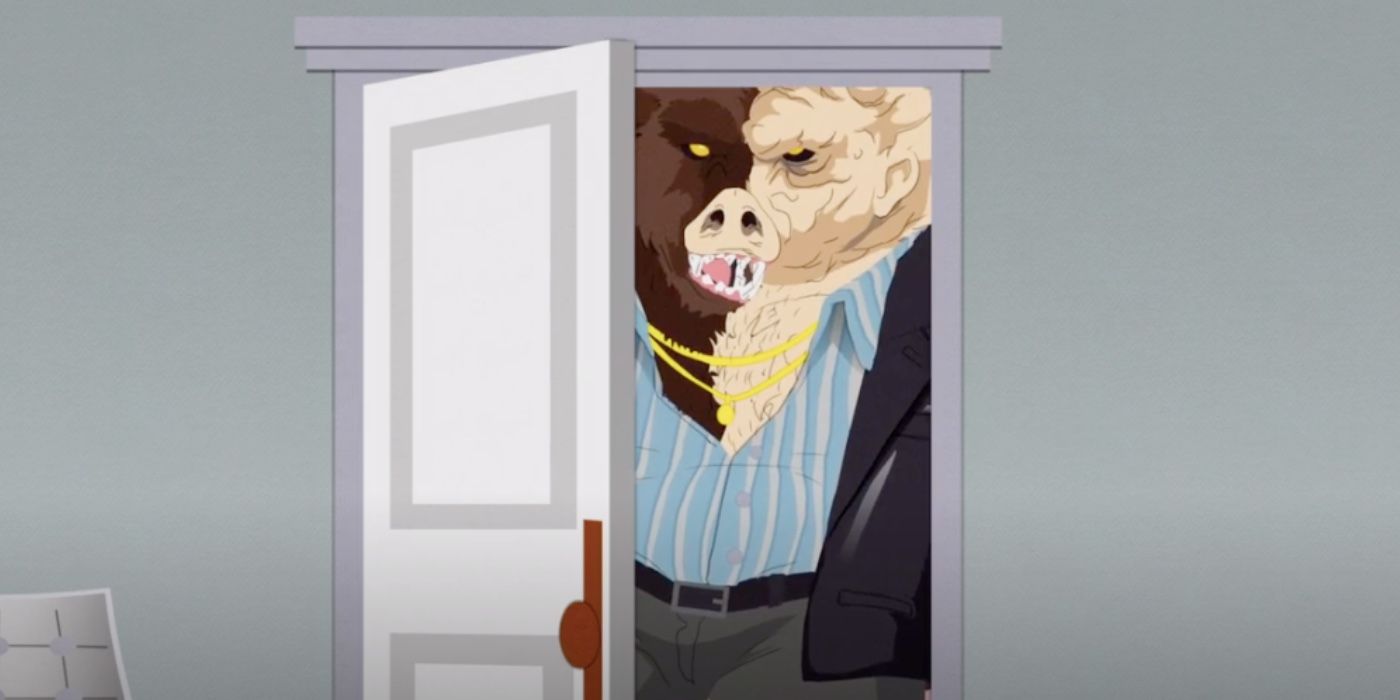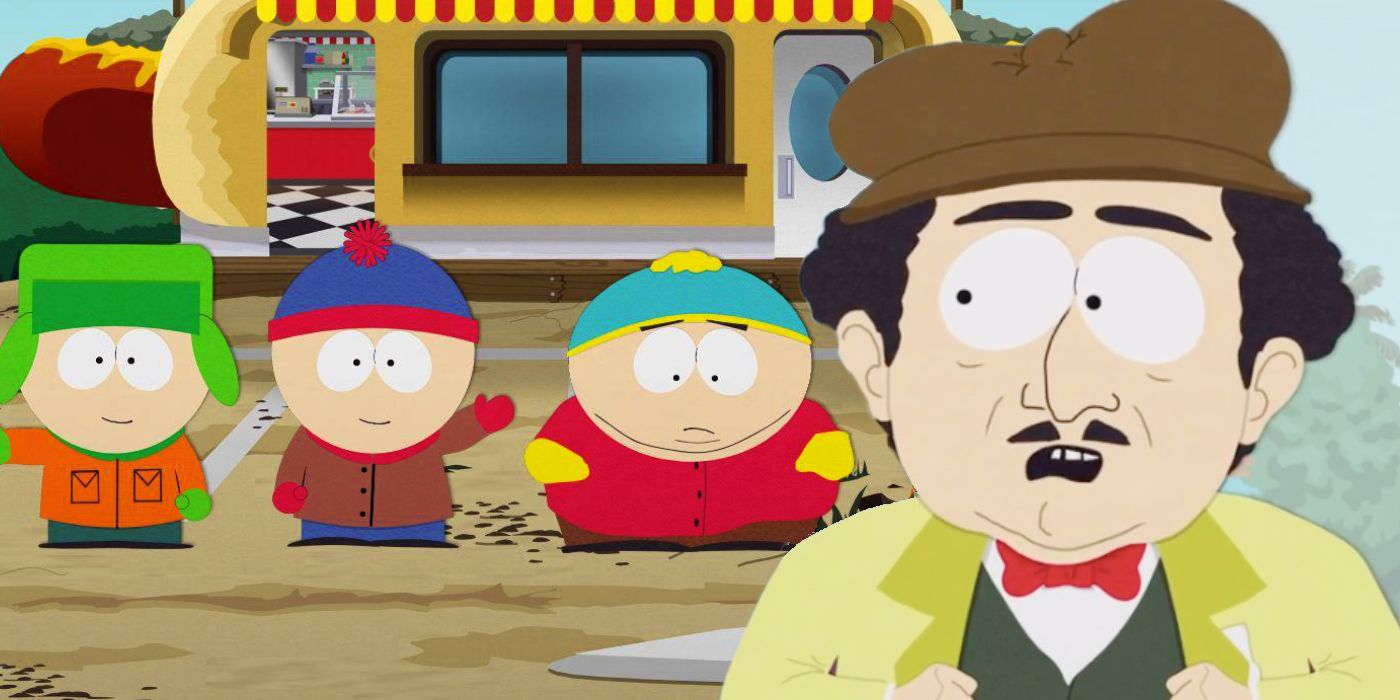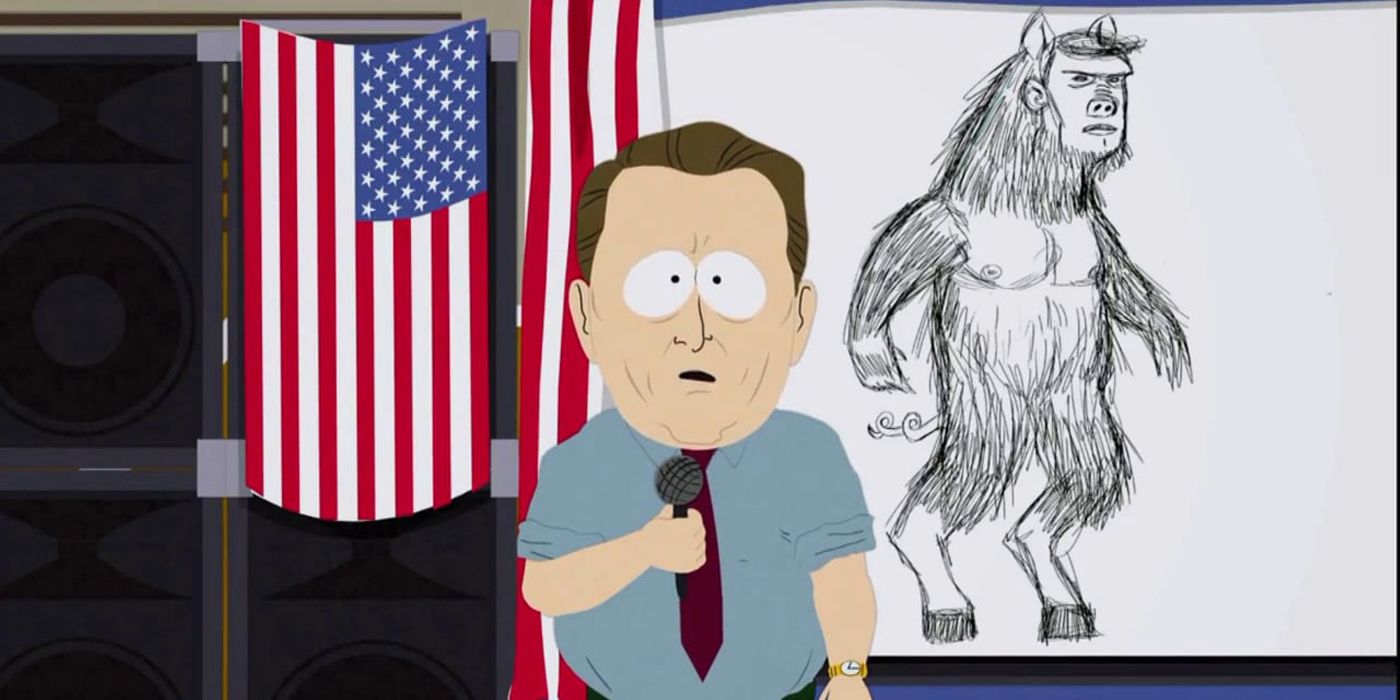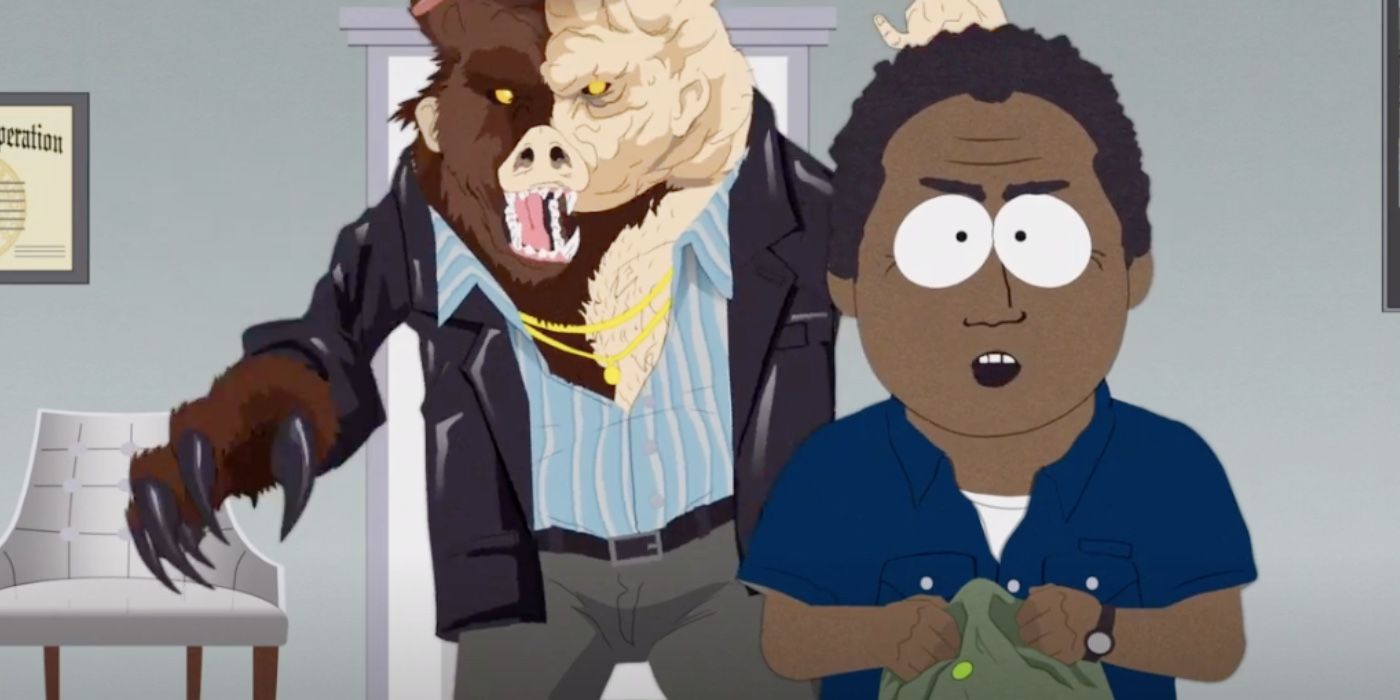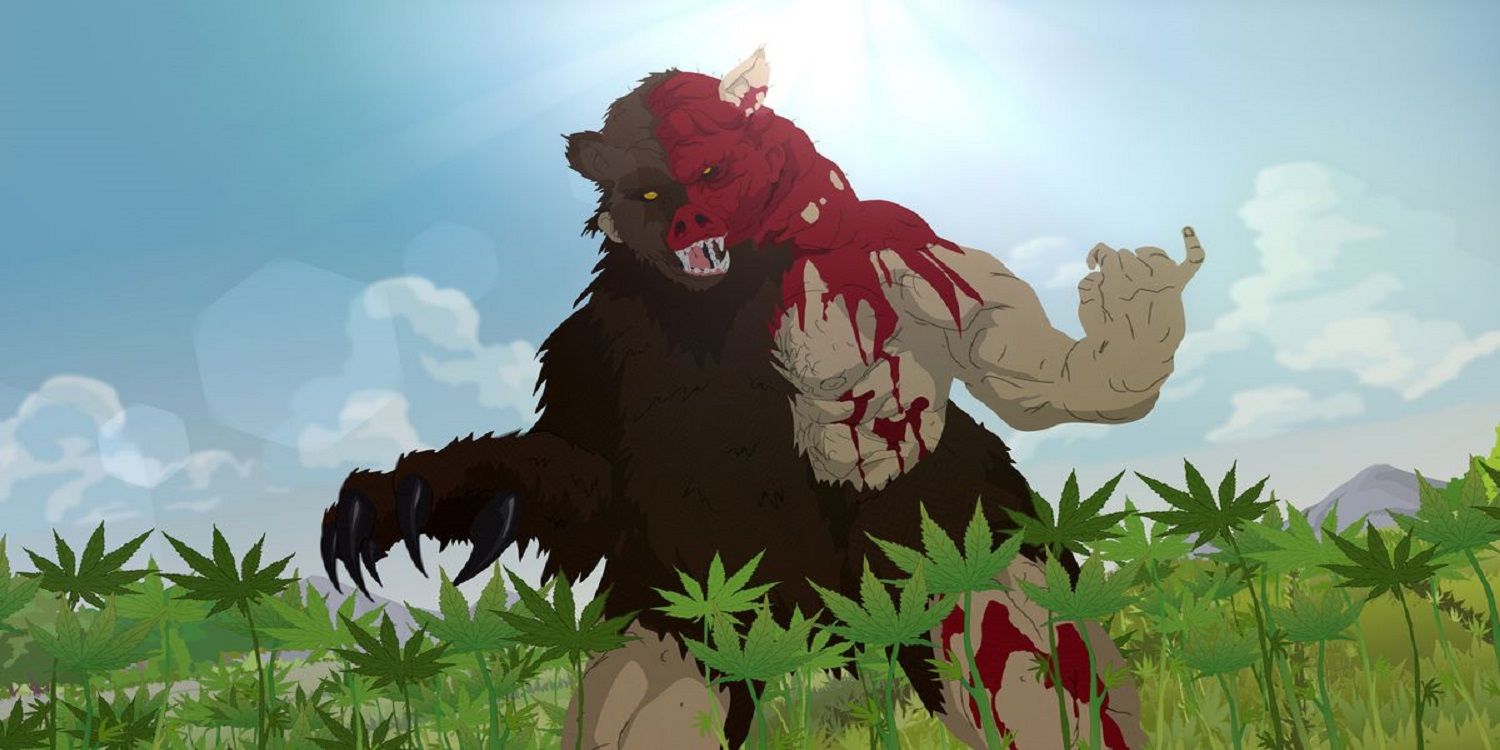Warning: Contains SPOILERS for South Park, The Streaming WarsThe latest South Park feature-length special The Streaming Wars introduced a bizarre new character in ManBearPig’s offspring, Chuck Chuck, prompting viewers to wonder what this thing was and what it could be intended to represent. Generally (but not always), there is a point underlining South Park’s surrealism. While the show’s earliest seasons featured truly bizarre occurrences solely for the sake of shock value, since around season 4, South Park has used its silly, heightened stories to comment on real-world issues, and Chuck Chuck is no exception.
Sometimes, these issues can be important social or cultural events and even real-life celebrities, politicians, and public figures. As superficially silly as Mr. Hankey the talking turd’s run-in with cancel culture was, his eventual arrival in Springfield was intended to be a joke about how The Simpsons creators handled the Apu controversy. Similarly, the infamous ManBearPig was not just an imaginary monster that former Vice President Al Gore made up in South Park, but also an obvious allegory for climate change.
In 2006, Gore’s documentary An Inconvenient Truth outlined the extent of global warming, climate change, and their combined effects on the environment in an urgent call to action. While the documentary was a success it wasn’t without its detractors, including the writers of South Park. South Park aired an episode where Gore was voicing similar doom saying concerns about ManBearPig, an imaginary threat, and in doing so, South Park implied that Gore’s warnings were hyperbolic and not worth taking seriously. South Park addressed this mistake years later, depicting ManBearPig as a terrifying monster and mocking the townspeople (and, by extension, the show’s creators) for smugly dismissing the threat years earlier. However, South Park’s latest special The Streaming Wars Part Two then went on to introduce the very weird, vaguely creepy Chuck Chuck, ManBearPig’s child. If ManBearPig’s current incarnation is South Park’s ongoing mea culpa for their misjudgment about climate change, the creature's offspring in the form of Chuck Chuck represents the enduring nature of the issue, continuing South Park's climate change retcon.
South Park’s Chuck Chuck Explained
Chuck Chuck doesn’t appear in The Streaming Wars Part One, but it does show up in the concluding chapter of the two-part feature-length South Park special. The creature could best be described as a nude, miniature ManBearPig that helps the South Park boys to escape Pi-Pi’s water park at the climax of the special, allowing them to help Randy Marsh take down the corrupt crypto/urine tycoon. Chuck Chuck is only seen onscreen a few times, but the animal appears to have a concealed mouth inside its mouth, implying that it might be an actor in a suit and not a real wild, animal. What all this means, however, is a more complicated question.
ManBearPig South Park’s Climate Change Shift
The original ManBearPig itself was an imaginary problem that Al Gore made up, and a transparent allegory for climate change. In 2019, South Park admitted that climate change was real and serious, making ManBearPig a monstrous killer that citizens were all too willing to ignore. The Streaming Wars Part Two’s ending doubled down on this, as even the uber-rich Pi-Pi could not stop a rampaging ManBearPig from tearing his head off once the creature went berserk. Thus, South Park has not only conceded that climate change is real but also appears to suggest that even greedy corporations like Pi-Pi’s waterpark aren't immune from the disastrous effects.
The Streaming Wars Shows South Park Understands Climate Change
In The Streaming Wars Part One, South Park depicts ManBearPig as a goon employed by big businesses and corrupt governments, which is a pretty accurate characterization of climate change as a phenomenon. Before the South Park special’s brutal crypto satire starts in earnest, most of The Streaming Wars Part One sees Pi-Pi seize control of the town's water supply with help from a corrupt local government official. ManBearPig acts as his heavy in this process, with the satirical implication being that climate change allows the same power companies and large corporations that caused the problem to profit off human suffering by privatizing access to public necessities like water (as Pi-Pi does, with ManBearPig’s assistance, at the end of The Streaming Wars Part One). So, with this context outlined, the purpose of Chuck Chuck becomes somewhat clearer.
Chuck Chuck Proves Climate Change Is Here To Stay
By introducing Chuck Chuck and ManBearPig’s mate, The Streaming Wars Part Two proves that the monster is something the people of South Park must learn to live with and not a villain that can simply be killed off conveniently. Pi-Pi the waterpark owner is killed in The Streaming Wars Part Two and the town’s water supply is revitalized via an absurd, uniquely South Park solution, but ManBearPig’s continuing presence in the community and the existence of his family make it clear that the town will still need to acclimate to environmentalism in the future. This is embodied in Chuck Chuck, but the animal’s weird appearance betrays another satirical target.
Chuck Chuck’s Other Purpose On South Park
The sort-of gross, sort-of-cute design of Chuck Chuck calls to mind Ewoks, Baby Yoda, and other famous mascots that were accused of being blatant merchandising opportunities. The animal’s barely glimpsed mouth-within-a-mouth also implies that it might be an actor in a suit, which again underlines the idea that Chuck Chuck isn't a real animal like ManBearPig, but rather a costume. Here, South Park might just be mocking the use of these cute, merchandise-pushing characters in many franchises. However, The Streaming Wars Part Two might also be suggesting that, while the creators admit climate change is real, that doesn’t mean that corporations won’t find a way to capitalize on the phenomenon and use it to push products.
Plenty of activists and critics alike have complained about greenwashing. This is a process wherein corporations that contribute to climate change facetiously claim to be environmentally friendly to boost their public image without making much in the way of meaningful, structural changes to their pollution-producing practices. Greenwashing allows companies that do major damage to the environment to look like they are helping to solve the problem, much like Chuck Chuck gives a cute (or at least, theoretically cute) face to a dangerous, unstable problem like ManBearPig. While South Park initially introduced a climate change allegory that suggested the entire phenomenon wasn’t real, The Streaming Wars Part Two fixes the problem, showing climate change as a real, dangerous issue that can be given a falsely cute, harmless veneer. Thus, The Streaming Wars Part Two deepens its satirical message in the creepy, surreal way only South Park can.

